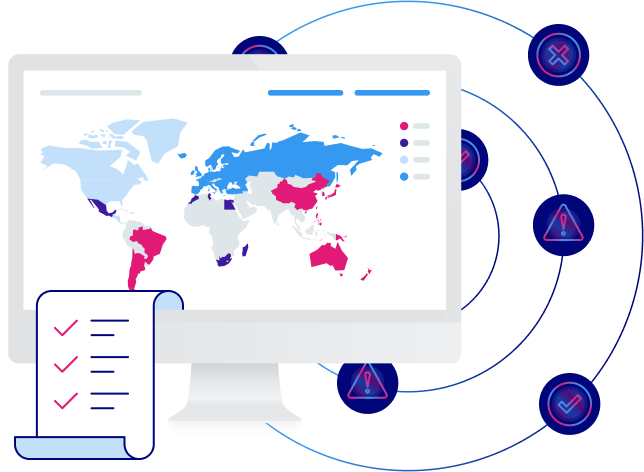-
Solutions
- AI Governance
- Responsible AI
- Geo-Specific Cookie Banner
- Consumer Preference Management
- Data Subject Request Automation
- Data Mapping and Vendor Risk Management
- Migrate
- Privacy, Vendor, and Risk Assessments
- Privacy Program Management
- Regulatory Guidance
- Privacy Program Consulting
- Certifications and Verifications
- International Data Transfers
Forrester TEI ROI of Privacy ReportTrustArc commissioned a Forrester study to analyze the potential benefits of using our platform and the Forrester team found ROI linked to efficiency, compliance, and decreased cost in data breaches.
Read the report -
Products Products Privacy Studio Overview
Automate consent and data subject rights compliance. Design seamless privacy experiences to enhance customer trust across your digital landscape.
- Cookie Consent Manager Effortlessly manage cookie consent for global compliance, ensuring a secure, personalized browsing experience.
- Consent & Preference Manager Easily manage and orchestrate customer consent and preferences across brands and channels.
- Individual Rights Manager Automate and streamline DSR workflows to ensure compliance and show your commitment to customer rights.
- Trust Center Centralize policies, disclosures, and trust-building information in a customizable no-code hub that speeds up deals.
Products Governance Suite OverviewStay ahead of privacy and compliance regulations. Simplify data privacy management and ensure data governance with cutting-edge apps.
- PrivacyCentral Centralize privacy tasks, automate your program, and seamlessly align with laws and regulations.
- Data Mapping & Risk Manager Gain full visibility and control of your data and accurately identify and mitigate risks.
- Assessment Manager Automate and score privacy assessments like PIAs and AI Risk, streamlining your compliance workflow.
- Nymity Research Get instant access to the latest in privacy regulations, legal summaries, and operational templates.
Products Assurance Services OverviewGain trust and credibility with leading privacy certifications from unbiased experts, backed by technology for unmatched privacy compliance assurance.
- Dispute Resolution
- TRUSTe Global CBPR and PRP Certification
- Data Privacy Framework Verification
- TRUSTe APEC CBPR and PRP Certification
- TRUSTe Responsible AI Certification
- TRUSTe Enterprise Privacy Certification
- CCPA/CPRA Validation
- GDPR Validation
- TRUSTe Data Collection Certification
- TRUSTe EDAA Privacy Certification
- Digital Advertising Alliance Validation
-
Regulations
- EU General Data Protection Regulation (GDPR)
- California Consumer Privacy Act (CCPA)
- Virginia Consumer Data Protection Act (CDPA)
- NIST AI Framework
- ISO/IEC 27001
EU Artificial Intelligence Act (EU AI Act)EU's regulation on the use of AI and the world's first comprehensive AI law.
Learn moreIndia Digital Personal Data Protection ActComprehensive data protection law governing the processing of personal data of Indian citizens.
Learn more - Resources
- Arc ✦
- Contact us
Canada’s Personal Information Protection and Electronic Documents Act
Canada’s PIPEDA establishes rules aimed at governing the processing of personal information in a manner that recognizes the right of privacy of individuals, whilst permitting organizations to meet their needs to process personal information.
Are you subject to the PIPEDA?
The PIPEDA applies to every organization that handles personal information:
- Throughout the course of its commercial activities; and
- Regarding an employee, or an applicant, in connection with the operation of a federal work, undertaking or business.
The PIPEDA does not apply to:
- Any government institution to the extent where the Privacy Act applies;
- Any individual who collects, uses or discloses personal information for personal or domestic purposes; and
Any organization who collects, uses or discloses personal information for journalistic, artistic or literary purposes.
Key obligations under the PIPEDA
Personal information principles
PIPEDA establishes 10 Fair Information Principles that data processing practices should be grounded in, including: accountability; identifying purposes; consent; limiting collection; limiting use, disclosure and retention; accuracy; safeguards; openness; individual access; and challenging compliance.
Individual rights
At the request of individuals, PIPEDA requires organizations to grant them their right to access information about themselves and the right to data correction.
Form of consent
Depending on the context, PIPEDA requires organizations to seek expressed consent from individuals prior to processing sensitive personal information; implied consent is sufficient when less- or non-sensitive information is intended to be processed.
Outsourcing
Ensure contracts are in place with vendors that process personal information requiring them to provide a comparable level of protection.

CBPR – Navigating Cross-Border Data Privacy Compliance
In this highly anticipated webinar, we explore the background the future direction and assess the potential business case for companies considering certification under the new Global CBPR System.
Achieve compliance
-
Privacy program development and compliance management Identify gaps and track compliance with PrivacyCentral – assess Canada PIPEDA regulation specifics and automatically get guidance on building out a sustainable privacy program.
-
Complete and maintain a data inventory Automate with TrustArc’s Data Inventory Hub. Save time and reduce risk with automated data flow mapping, risk analysis, and remediation for personal data processes and vendor management.
-
Exercising individual rights Enjoy DSR automation with TrustArc’s Individual Rights Manager. Easily operationalize individual rights according to specific jurisdictions, leverage automated workflows to save time, and keep an audit trail of requests/actions.

The information provided does not, and is not intended to, constitute legal advice. Instead, all information, content, and materials presented are for general informational purposes only.





